SSDI Lawsuits: Essential Guide to Legal Representation
- Last Updated: June 12th, 2025

Attorney Jessica Paluch-Hoerman, founder of TruLaw, has over 28 years of experience as a personal injury and mass tort attorney, and previously worked as an international tax attorney at Deloitte. Jessie collaborates with attorneys nationwide — enabling her to share reliable, up-to-date legal information with our readers.
Legally Reviewed
This article has been written and reviewed for legal accuracy and clarity by the team of writers and legal experts at TruLaw and is as accurate as possible. This content should not be taken as legal advice from an attorney. If you would like to learn more about our owner and experienced injury lawyer, Jessie Paluch, you can do so here.
Fact-Checked
TruLaw does everything possible to make sure the information in this article is up to date and accurate. If you need specific legal advice about your case, contact us by using the chat on the bottom of this page. This article should not be taken as advice from an attorney.
Key takeaways:
- SSDI lawsuits can be a daunting task, especially when your personal injury case is at stake.
- Navigating SSDI lawsuits can be tricky. That's where a seasoned attorney comes into play.
- A crucial part of any SSDI application is substantiating the claim with medical evidence.
SSDI Lawsuits: Essential Guide to Legal Representation
On this page, we’ll discuss legal representation in SSDI lawsuits, the role of an SSDI attorney, who qualifies to file an SSDI lawsuit, and much more.
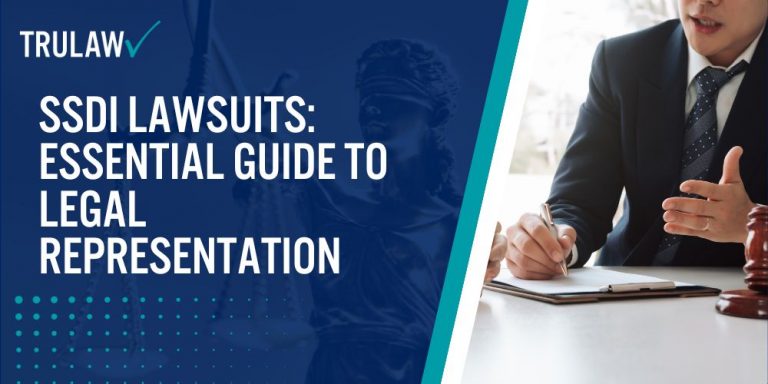
Intro to SSDI Lawsuits
Navigating the complex world of SSDI lawsuits can be a daunting task, especially when your personal injury case is at stake.
Legal representation plays a pivotal role in these situations, serving as your advocate and protector of rights.
With an attorney’s guidance, you are better equipped to understand the potential outcomes of your personal injury settlement.
Conversely, without this expert counsel, you may find yourself at a disadvantage, potentially compromising the result of your case.
Let’s delve into the importance of legal representation in SSDI lawsuits and how it can influence the outcome.
Table of Contents
The Role of SSDI Attorneys: Advocating for Disability Benefits
SSDI attorneys play a crucial part in advocating for clients’ disability benefits.
They are instrumental during the application process and help navigate complex laws.
Navigating Clients Through SSDI Lawsuits Benefits
Disability attorneys, like navigators on a treacherous sea, guide their clients through the stormy waters of Social Security Disability benefits applications.
They understand the ins and outs of this complicated process.

Here are some instances for Lawsuit SSDI benefits:
- They know how to fill out forms correctly.
- They can gather necessary medical records and other evidence.
- They can represent clients at hearings if necessary.
This expert guidance can make a significant difference to an applicant’s success in securing SSDI benefits.
Role During Application Process
An attorney’s role during the SSDI application process is multifaceted.
Not only do they provide legal advice, but they also offer moral support and reassurance to their clients.
Here are things that what they typically do:
- Review the client’s case thoroughly.
- Gather all relevant medical records.
- Prepare and submit the initial application.
- Handle any appeals if the initial claim is denied.
Their expertise often results in quicker decisions and higher chances of approval for disability insurance benefits.
Importance of Knowledgeable Representation
Navigating complex laws surrounding SSDI benefits can be daunting without knowledgeable representation from a disability attorney.
These laws aren’t always straightforward; they’re like a labyrinth that requires a skilled guide to traverse successfully.
A seasoned attorney is well-versed with key legislation such as the Justice Act, which impacts compensation benefits for disabled workers, or specific conditions like Black Lung Benefits for miners.
Their understanding extends beyond SSDI benefits to include related areas such as Supplemental Security Income (SSI) benefits.
For example, Secretary Harris was able to secure SSI benefits for her client after he was initially denied both SSI and SSDI due to a misinterpretation of his medical records.
This case highlights the importance of having an attorney who can advocate effectively for their clients, ensuring they receive the support and services they are entitled to.
Choosing the Right SSDI Attorney: Factors to Consider
Selecting an SSDI attorney involves several key factors, including their experience and success rate.
Communication skills and cost-effectiveness are also crucial considerations.
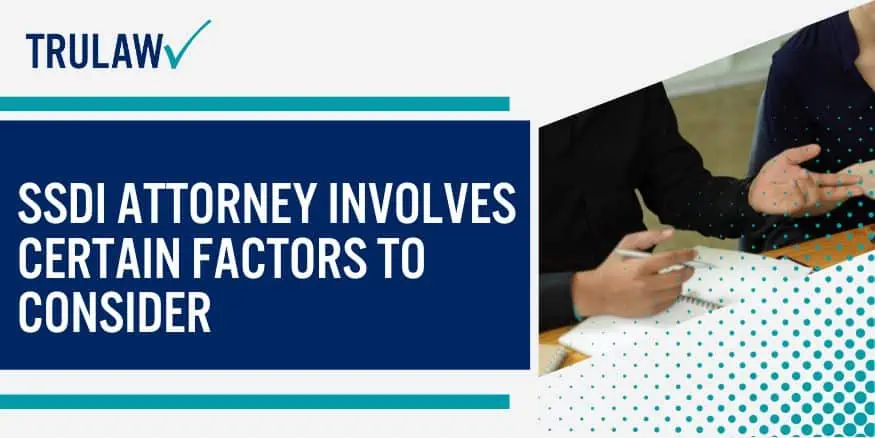
Experience and Success Rate
Experience is a game-changer. An experienced attorney will know the ins and outs of the system.
They’ve seen it all before, which gives them an edge.
For example, seasoned attorneys can predict potential roadblocks in your case.
They can devise strategies based on past successful cases.
Success rate is another critical factor.
Look for lawyers who have a track record of winning SSDI lawsuits.
A high success rate indicates competence.
It’s a testament to their knowledge, skillset, and dedication.
Remember not to confuse quantity with quality.
A lawyer handling hundreds of cases might not give yours the attention it deserves.
Communication Skills Matter
The importance of communication skills in your potential lawyer cannot be overstated.
You want someone who will listen attentively to your concerns and explain complex legal jargon in plain English.
Good communication fosters trust between you and your attorney.
It ensures that you’re always on the same page about how your case is progressing.
For instance, they should update you regularly about any developments in your case.
They should be easily reachable via phone or email whenever you have queries or concerns.
Cost-effectiveness Is Key
Hiring an attorney shouldn’t leave you bankrupt.
This is where cost-effectiveness comes into play.
Ensure that the services provided justify the fees charged by the lawyer.
Some workers may hesitate to hire an attorney due to financial constraints.
However, remember that most SSDI attorneys work on a contingency basis — they only get paid if they win your case!
Therefore, they’ll be motivated to secure a favorable outcome for you.
Also, this arrangement reduces financial risk on your part.
Consulting an Attorney: The First Step in SSDI Legal Proceedings
Navigating SSDI lawsuits can be tricky. That’s where a seasoned attorney comes into play.
Importance of Initial Consultation with SSDI Lawsuits
An initial consultation sets the stage for your legal journey.
It’s like the first step on a long hike; you need to get it right to reach your destination successfully.
This meeting is not just an oral inquiry but a crucial chance to build a rapport with your lawyer and clarify all doubts regarding the lawsuit.
During this session, you’ll discuss the specifics of your case, including details about your injury and any waiting period you’ve endured since becoming disabled.
Your attorney will use this information to assess the viability of your claim under 1st provisions.
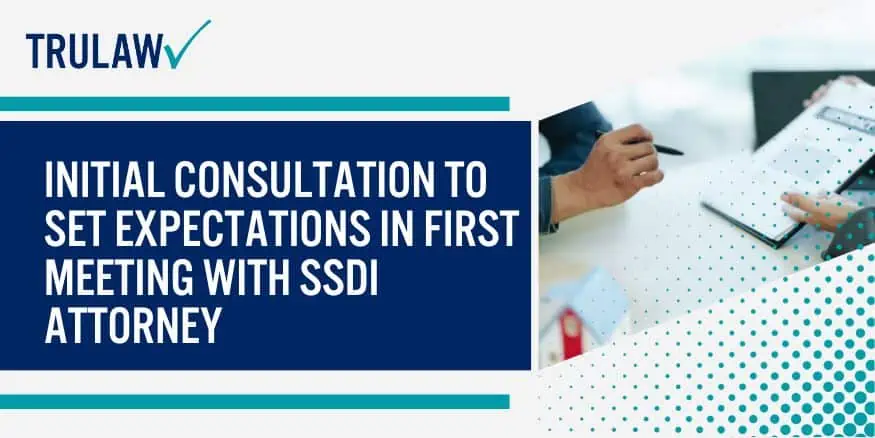
Preparing for Your First Meeting
Preparation is key when meeting with your lawyer for the first time.
Bring along all relevant documents such as medical records, work history, and any correspondence with Social Security Administration (SSA).
Here are the things you must have and bring:
- Medical records should provide detailed information about your disability.
- Work history will help demonstrate how your disability affects your ability to work.
- Correspondence from SSA may include denial letters or notices about upcoming hearings.
Remember, knowledge is power in SSDI lawsuits.
The more prepared you are, the better equipped you’ll be to handle what’s coming next.
Setting Expectations
The initial consultation also helps set expectations for the legal proceedings ahead.
Your attorney will explain the process in detail – from filing an appeal to possibly receiving a lump sum settlement if successful.
Here are the things about potential hurdles that could prolong the lawsuit such as:
- Additional evidence requested by SSA
- Delays due to backlog of cases
- Changes in SSA rules or regulations
Setting clear expectations can help alleviate anxiety associated with SSDI lawsuits and prepare you mentally for what lies ahead.
Assessing Your SSDI Case: Does It Require Legal Representation?
Before diving deep into the matter, it’s essential to understand that not all SSDI (Social Security Disability Insurance) lawsuits require legal representation.
However, certain complexities and challenges may necessitate professional help.
Identifying If Your Case Needs Professional Help
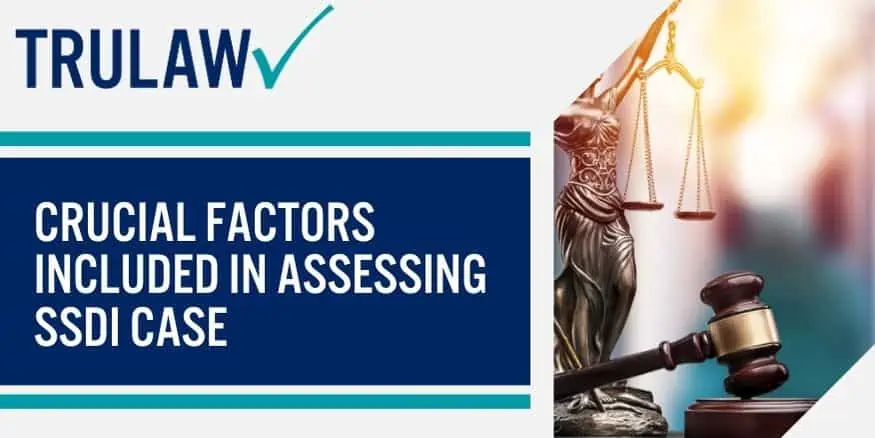
The first step in assessing your SSDI case is identifying whether you can handle it yourself or if it requires a professional’s touch.
Simple cases often involve straightforward medical conditions and clear-cut disability status, making them manageable without legal assistance.
Complex cases, on the other hand, might involve ambiguous medical conditions or complicated work history.
These typically demand a lawyer’s expertise.
For instance, if your claim involves a rare medical condition or disputes about your working capacity, you’d be better off with an attorney by your side.
Evaluating Complexity and Potential Challenges
It’s crucial to evaluate the complexity of your case and anticipate potential challenges.
This step helps determine whether you need a lawyer for your SSDI lawsuit.
The Social Security Administration (SSA) uses specific criteria to evaluate disability claims.
If your case falls outside these standard parameters, it could be deemed complex.
A common challenge in SSDI lawsuits is proving the severity of one’s disability.
This is especially true when dealing with mental health issues or chronic pain disorders.
Take note of recent stats: nearly 60% of initial SSDI applications are denied due to insufficient evidence or failing to meet SSA’s disability criteria.
In such scenarios, having an experienced lawyer can tilt the odds in your favor.
Understanding When It’s Beneficial To Hire A Lawyer
Lastly but importantly is understanding when hiring an attorney for your claim becomes beneficial.
Lawyers specializing in SSDI lawsuits have insider knowledge about how the SSA works.
They know what kind of evidence will strengthen your claim and how best to present it before an Administrative Law Judge (ALJ).
A recent study by the Government Accountability Office (GAO) revealed that claimants represented by attorneys were almost three times more likely to win their SSDI lawsuits than those without legal representation.
Navigating the SSDI Application Process with Legal Assistance
The Lawyer’s Role in Application Forms
When applying for Supplemental Security Income (SSI) or Social Security Disability Insurance (SSDI), legal assistance can be invaluable.
Lawyers are adept at navigating the complexities of these forms, ensuring they’re filled out correctly to avoid unnecessary rejections.
They have a deep understanding of eligibility criteria and know how to present your case in a way that aligns with the Administration’s guidelines.
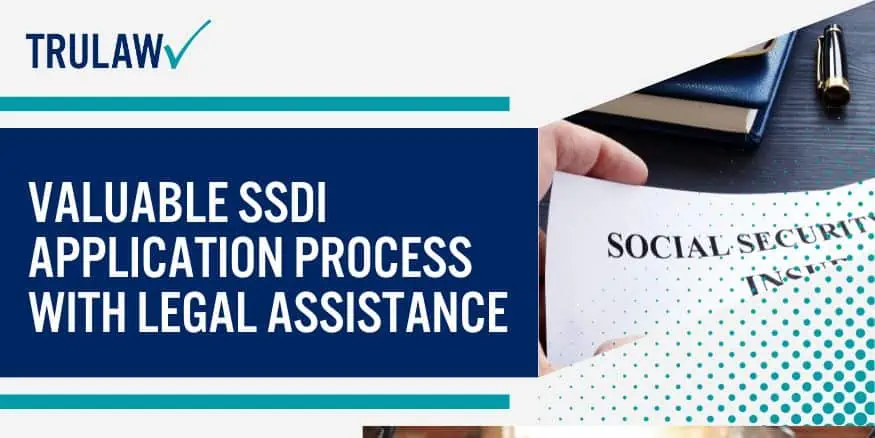
For instance, if you’re applying on behalf of a disabled child, an attorney would know how to frame your application around vocational guidelines and special needs trust provisions.
This expertise reduces errors and increases chances of approval.
Timely Submission and Follow-ups
The SSDI application process is time-sensitive.
Missing deadlines can lead to delays or outright denial of benefits.
Lawyers ensure timely submission of applications and necessary follow-ups with the SSA.
They understand the importance of expedited processing in cases involving severe disability or financial need.
In some cases, lawyers may even negotiate simplified waiver processes under Title II provisions for quicker access to benefits.
Gathering Medical Evidence
A crucial part of any SSDI application is substantiating the claim with medical evidence.
Lawyers play an instrumental role here too.
They liaise with healthcare providers to gather comprehensive medical records that support your disability claims.
Moreover, they help interpret complex medical information into layman’s terms, making it more comprehensible for administrative law judges during hearings if required.
Appealing Denied Claims: The Importance of Legal Expertise
Significance of Experienced Counsel during Appeals Process
Navigating the SSDI appeals process after a claim denial can be daunting.
Having an experienced counsel by your side is crucial.
Lawyers familiar with administrative appeals understand the complexities involved.
They guide claimants through every step, ensuring they meet all requirements and deadlines.
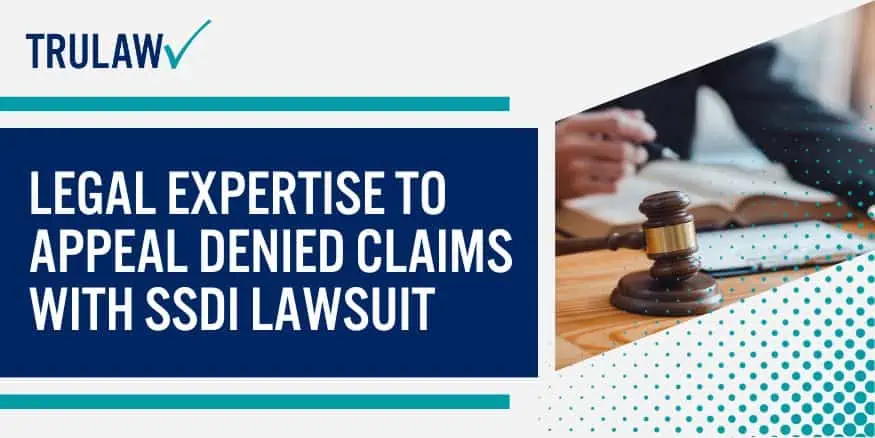
Here are the things that are considered as guides during Appeals Process:
- They help prepare for hearings before an administrative law judge.
- They assist in gathering necessary evidence to support the claim.
- Their expertise increases the chances of a successful appeal.
Legal Strategies in SSDI Lawsuits: Maximizing Your Chances of Success
Developing Effective Legal Strategies
Lawyers play a pivotal role in SSDI lawsuits. They develop effective legal strategies tailored to the specifics of your case.
For instance, they might focus on proving that you’re unable to engage in gainful activity due to your disability or that the recovery time exceeds the time limitation set by SSDI laws.
To build these strategies, attorneys meticulously review medical records, consult with medical experts and gather pertinent evidence.
They also prepare compelling arguments to counter any objections raised by the Social Security Administration (SSA).

Understanding SSDI Laws and Regulations
Knowledge is power, especially.
These rules dictate how disability is defined, who qualifies for benefits, what evidence is needed and how appeals are handled.
Having a thorough understanding of these laws allows lawyers to craft strategic plans.
For example, they can anticipate potential challenges based on SSA policy and devise ways around them.
This knowledge also helps them advise clients on their rights and options.
The Role of Attorneys in Settlements and Trials
Attorneys don’t just develop legal strategies; they actively negotiate settlements or prepare for court trials.
Their goal is always to secure the best possible outcome for their clients.
In negotiations, they use their understanding of SSDI laws to argue why a claim should be approved or why a denied claim should be reconsidered.
If negotiations fail, they’re ready to take the case to trial where they present evidence, cross-examine witnesses and make persuasive arguments before a judge.
Understanding SSDI Hearings: What to Expect in Court
Navigating the courtroom process can be daunting.
Here’s what you need to know about preparing for hearings, presenting a strong case, and the role of an attorney.
Preparation is Key
Before stepping into any state court or hearing office, preparation is absolutely essential.
Knowledge about courtroom procedures and what to expect during hearings can alleviate anxiety and instill confidence.
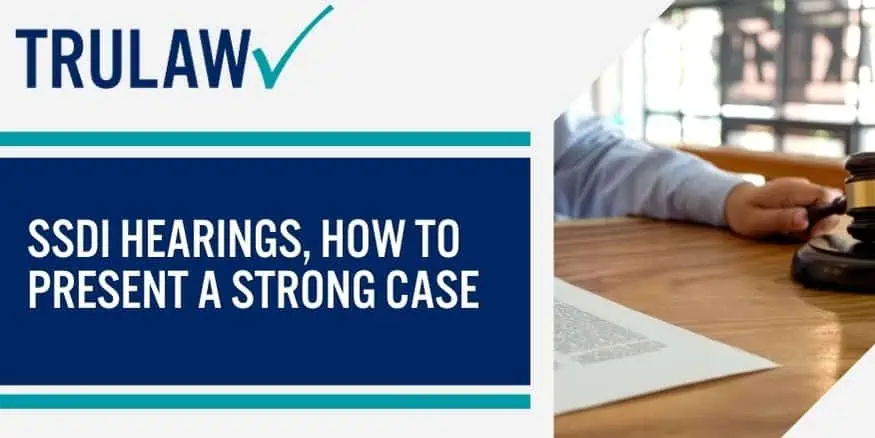
Here are the things part of your preparation:
- Familiarize yourself with the layout of the hearing offices.
- Understand the flow of proceedings at hearings level.
- Be prepared to answer questions from both your attorney and opposing counsel.
For instance, in 2019, a study found that clients who were well-prepared for their SSDI hearings had a higher success rate compared to those who weren’t.
This clearly emphasizes the importance of preparation before court appearances.
Presenting a Strong Case
Presenting a compelling case during SSDI hearings is critical.
This involves gathering substantial evidence, forming coherent arguments, and articulating them effectively.
Gather medical records, employment history, and witness testimonies.
Clearly communicate how your disability affects your ability to work.
Respond honestly and directly to all questions posed during the hearing.
A notable example is John Doe vs SSA (2020), where Doe successfully argued his case by providing comprehensive medical records showing his inability to perform any gainful activity due to his disability.
His clear presentation made it easier for him to win his lawsuit.
The Crucial Role of an Attorney
An experienced attorney plays a pivotal role in cross-examining witnesses and countering opposing arguments during SSDI hearings.
They bring expertise not only in understanding complex legal jargon but also in navigating through intricate courtroom procedures.
An attorney can identify potential weaknesses in your case and prepare counterarguments.
They guide you through every step of the hearing process.
Their experience allows them insight into how judges typically make decisions at this level of court.
In 2018, the National Organization of Social Security Claimants’ Representatives reported that claimants represented by attorneys were more likely to win their SSDI lawsuits.
This underlines the importance of legal representation in these hearings.
Attorney Fees in SSDI Cases: How Payment Works
Unraveling Fee Structure and Payment Terms
When you’re knee-deep in an SSDI lawsuit, understanding the fee structure and payment terms with your lawyer is crucial.
This knowledge can prevent any unexpected surprises when it’s time to settle attorney fees.
Lawyers handling SSDI cases typically operate on a contingency fee basis.
This means they only get paid if you win your case.
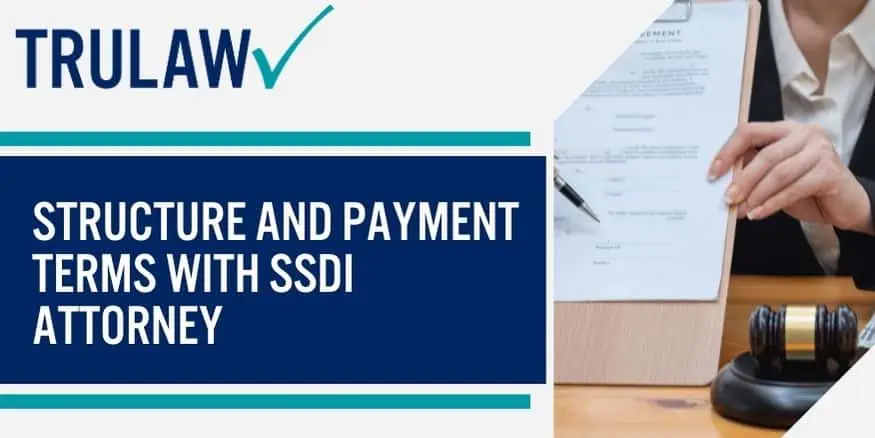
Legal Provisions Regulating Attorney Fees
Legal provisions exist to regulate attorney fees in SSDI cases.
The Social Security Administration (SSA) must approve all fees for disability representation.
Under SSA rules, attorneys can charge a standard fee of 25% of your backpay or $6,000, whichever is less.
This cap ensures that legal representation remains accessible to individuals seeking disability benefits.
For instance, if you’re awarded $20,000 in backpay, your attorney’s fee would be $5,000 (25% of $20,000).
If the backpay was $30,000 or more, the fee would be capped at $6,000.
Contingency Fee Agreement in Disability Claims
The most common payment method for SSDI cases is the contingency fee agreement.
Here are the things that will help you how it works:
- You and your attorney agree that the lawyer will receive a percentage of your compensation settlement if you win.
- If you lose the case, you owe nothing to the lawyer.
- Your lawyer submits a fee agreement to SSA for approval once your claim is successful.
- After approval by SSA, they deduct attorney fees from your lump sum settlement before sending it over.
This arrangement protects claimants from paying upfront costs while ensuring lawyers are compensated for their work.
However, there may be additional costs not covered by this agreement such as medical record requests or expert witness fees which should be clarified beforehand.
Compensation Settlements and Work Deductions
Understanding potential work deductions is essential.
If you return to work while receiving SSDI benefits, SSA may reduce your benefits based on your wages.
This is known as the compensation offset.
It’s designed to encourage beneficiaries to return to work without losing all their benefits.
In some cases, a lump sum payment might be awarded.
This could be due to delayed payments or backpay for the time you were disabled but not yet approved for benefits.
Client-Attorney Relationship: Collaborating for SSDI Benefits
An SSDI attorney not only guides clients through the complex application process, but also represents their interests effectively in court.
Their expertise is invaluable, especially when appealing denied claims or understanding what to expect at hearings.
They play a pivotal role in maximizing the chances of success in SSDI lawsuits.
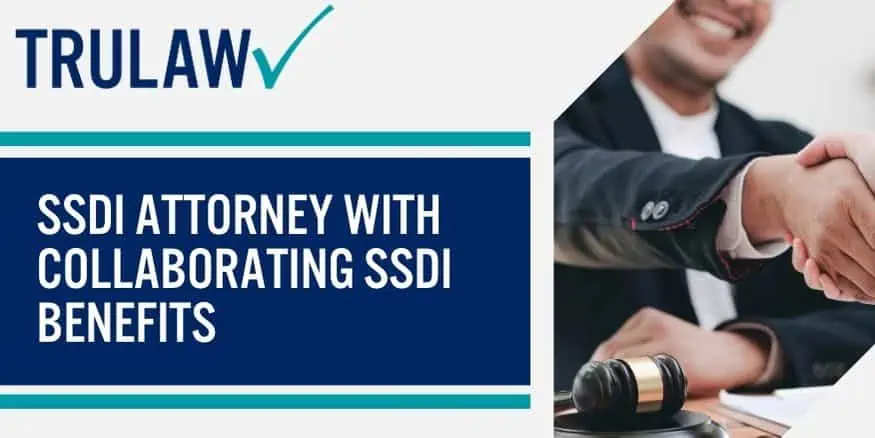
It’s crucial to choose the right legal representative considering factors such as experience, reputation, and fee structure.
The journey towards obtaining SSDI benefits can be challenging and confusing.
However, with the right attorney by your side, you can navigate this path more confidently and efficiently.
Don’t hesitate to consult an attorney if you’re contemplating applying for disability benefits or if your claim has been denied.
Their advice could make all the difference between a successful claim and a disappointing denial.
Social Security Disability Insurance Frequently Asked Questions
-
An SSDI attorney helps clients apply for Social Security Disability Insurance (SSDI) benefits and represents them during appeals if their claims are denied.
-
Hiring an SSDI attorney can significantly increase your chances of success as they understand the complexities of the system and can help present your case effectively.
-
Most SSDI attorneys work on a contingency basis which means they get paid only if they win your case.
The fee is usually a percentage of any backpay awarded by Social Security.
Also with consideration for medical professional, federal court, appeals council and federal agency regulations that are applicable.
-
Yes, you can represent yourself but it’s generally not advised due to the complexity of laws surrounding disability benefits.
An experienced lawyer increases your chances of winning your case.
-
During an SSDI hearing, you will present evidence supporting your disability claim before an administrative law judge.
Your attorney will guide you through this process and represent your interests.

Managing Attorney & Owner
With over 25 years of legal experience, Jessica Paluch-Hoerman is an Illinois lawyer, a CPA, and a mother of three. She spent the first decade of her career working as an international tax attorney at Deloitte.
In 2009, Jessie co-founded her own law firm with her husband – which has scaled to over 30 employees since its conception.
In 2016, Jessie founded TruLaw, which allows her to collaborate with attorneys and legal experts across the United States on a daily basis. This hypervaluable network of experts is what enables her to share the most reliable, accurate, and up-to-date legal information with our readers!
Additional Social Security Disability Insurance resources on our website:
Here, at TruLaw, we’re committed to helping victims get the justice they deserve.
Alongside our partner law firms, we have successfully collected over $3 Billion in verdicts and settlements on behalf of injured individuals.
Would you like our help?
At TruLaw, we fiercely combat corporations that endanger individuals’ well-being. If you’ve suffered injuries and believe these well-funded entities should be held accountable, we’re here for you.
With TruLaw, you gain access to successful and seasoned lawyers who maximize your chances of success. Our lawyers invest in you—they do not receive a dime until your lawsuit reaches a successful resolution!
AFFF Lawsuit claims are being filed against manufacturers of aqueous film-forming foam (AFFF), commonly used in firefighting.
Claims allege that companies such as 3M, DuPont, and Tyco Fire Products failed to adequately warn users about the potential dangers of AFFF exposure — including increased risks of various cancers and diseases.
Depo Provera Lawsuit claims are being filed by individuals who allege they developed meningioma (a type of brain tumor) after receiving Depo-Provera birth control injections.
A 2024 study found that women using Depo-Provera for at least 1 year are five times more likely to develop meningioma brain tumors compared to those not using the drug.
Suboxone Tooth Decay Lawsuit claims are being filed against Indivior, the manufacturer of Suboxone, a medication used to treat opioid addiction.
Claims allege that Indivior failed to adequately warn users about the potential dangers of severe tooth decay and dental injuries associated with Suboxone’s sublingual film version.
Social Media Harm Lawsuits are being filed against social media companies for allegedly causing mental health issues in children and teens.
Claims allege that companies like Meta, Google, ByteDance, and Snap designed addictive platforms that led to anxiety, depression, and other mental health issues without adequately warning users or parents.
Transvaginal Mesh Lawsuits are being filed against manufacturers of transvaginal mesh products used to treat pelvic organ prolapse (POP) and stress urinary incontinence (SUI).
Claims allege that companies like Ethicon, C.R. Bard, and Boston Scientific failed to adequately warn about potential dangers — including erosion, pain, and infection.
Bair Hugger Warming Blanket Lawsuits involve claims against 3M — alleging their surgical warming blankets caused severe infections and complications (particularly in hip and knee replacement surgeries).
Plaintiffs claim 3M failed to warn about potential risks — despite knowing about increased risk of deep joint infections since 2011.
Baby Formula NEC Lawsuit claims are being filed against manufacturers of cow’s milk-based baby formula products.
Claims allege that companies like Abbott Laboratories (Similac) and Mead Johnson & Company (Enfamil) failed to warn about the increased risk of necrotizing enterocolitis (NEC) in premature infants.
Here, at TruLaw, we’re committed to helping victims get the justice they deserve.
Alongside our partner law firms, we have successfully collected over $3 Billion in verdicts and settlements on behalf of injured individuals.
Would you like our help?

